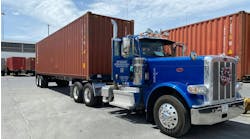At the same time Mack Trucks Inc. became a subsidiary of Volvo Global Truck Co., Paul Vikner, Mack’s executive vp of sales and marketing, decided it was time to get out of the commercial trucking business. Vikner, who had joined Mack in 1995 as its senior vp of sales and took on the role of executive vp of sales and marketing the following year, decided that after 30 years in the business, it was time to try something new.
But six months after walking away, looking to experience something new career-wise, Vikner will return to Allentown, PA-based Mack in a higher capacity – as it’s president & CEO.
“It was an interesting six months and I would recommend it to anybody if you can work it out,” Vikner told Fleet Owner. “You can really do some soul-searching about what you want to do with your life. And the conclusion I came to was I like this truck business quite a bit.”
When Volvo Global Truck was formed in January to encompass Mack, Volvo Trucks North America and Renault Vehicules Industrials, was that it appeared Vikner’s position was eliminated. But Vikner said the real reason for his departure was his desire to try something different. Over the last six months, Vikner has done some traveling with his wife, Sally, and he began exploting some teaching opportunities. But when Volvo Trucks North America president & CEO Marc Gustafson stepped down from his position for personal reasons in February, Volvo Global Trucks started calling to see if he was interested in returning to Mack.
“Just about the time I was thinking about what I could do in this business again, I started having talks with Volvo,” Vikner said. “After 30 years in the business, I realized I really liked it more than I guess I thought I did.”
And June 15, just six months after Vikner left the scene, Gigou replaced Gustafson at Volvo Trucks North America, and Vikner became Gigou’s successor at Mack.
Interesting Time
Vikner is not far removed from the game, but the landscape has changed. The EPA and the Justice Department recently announced that the consent decrees engine manufacturers signed in 1998 to produce cleaner-burning engines by October 2002 would be enforced. Truck makers such as Dina and Bering have halted production, and the large multi-brand companies such as DaimlerChrysler have begun restructuring their units.
Despite the current difficult market conditions, Vikner believes this is really an exciting time to be in the industry. “We know there is a lot of uncertainty in the market,” Vikner said. “Out of all this, the companies that manage restructuring and working with dealer networks and suppliers in the next six to 12 to 18 months have the potential to be extremely strong and powerful organizations when this market finally does come back, which it will. “So while there’s a lot of gloom and doom talk out there and a lot of speculating about what’s behind the curtain, I think it’s a great time to be in the industry,” Vikner said.
Volvo Ties
Vikner and Gigou worked together at Mack since 1996, when Gigou took over as its president & CEO. Their working relationship will help Volvo Global Truck’s management team, but it doesn’t mean one truck maker will swallow the other. However, Vikner said there will be some synergies, since Volvo and Mack are a part of the some group.
“Michel and I knowing each other quite well will be an asset to two companies with two different brands that, from time to time, will be working together with some things like long-term product development, platform development and partnerships with suppliers,” Vikner said. “But it’s obviously very clear that Volvo Global Trucks wants Mack and Volvo to be distinct, separate brands, and in some cases to compete out in the marketplace.”
It’s to the parent group’s advantage that Mack continues to do the things that make it successful, and that Volvo continues to grow as well, Vikner said.
“It’s very clear we will remain competitors,” he said. “We will have separate networks of franchises and separate brands, marketing promotions and advertising in the marketplace. Overwhelmingly we’re going to be very, very separate, though there will be some synergies.
“The fact Michel and I know each other and are part of a global group, there will be some synergies. But from the customer standpoint we will be aggressive and separate companies that will at times compete very aggressively,” Vikner said.
As for a common engine manufacturing venture, which led speculation when Volvo Global Trucks was formed, Vikner said that decision has yet to be made.
“Obviously, whenever large companies like this come together, there is at least a process of rationalizing and studying the best ways to use the manufacturing capacities,” Vikner said, adding that from short term standpoint. The company’s Hagarstown plant will continue to make Mack engines and Mack transmissions. “Once we get into new generations of engines, once we look to see where we have to be after 2002 and into the next generation of global engines, the where and how will be structured. It’s way too premature to speculate about that.
“But realistically let’s face it,” Vikner added. “With all the research and development costs necessary to engineer, develop, manufacture and distribute much more efficient, much cleaner engines for the future, there are a lot of decisions that will have to be made about the assembling and manufacturing.”
The Heavy-Duty Slump
While U.S. Heavy-Duty truck sales have been in an industry-wide rut, Vikner is predicting a better year for 2002. However, because of its diversified product line, Mack has not been hit as badly as other U.S. manufacturers. In fact, Mack’s market share is up 3% through the first five months of this year when compared to the same time last year.
“One thing that has helped up is that the construction industry has held up a lot better than the truckload segment,” Vikner said. “To me, that market share climb is a lot of points, and in this market condition we are proud of that.”
According to Vikner, Mack’s diversification has allowed it to capitalize on its strength in the vocational, specialized construction and and daycab markets, which has helped keep its market share growing.
“That diversification will help us keep our plants running better than most of our competitors,” Vikner said. “The product line has helped us along in this particular year, which we think is going to be the worst year in the cycle.”
Industry-wide, Vikner said the inventory situation at the dealer level for all manufactures has improved. Factory sales in the U.S. will be about 15-20,000 lower than retail sales, which means that much inventory will be reduced this year.
“Now we think inventories are back on track for this year,” Vikner said. “And so we see 2002 as being a better manufacturing year and factory sales year, and much more focused on all the OEMs managing more carefully the balance of factory sales and inventory sales, and watching the inventories very carefully.”
The industry bottomed out in the latter part of 1999 and into 2000, Vikner said, because it let the euphoria and the wild buying frenzy get a little bit out of hand. “Some of us increased our output and capacity and now have had to pay the piper, so to speak,” he said.
“People are on a much better course to work through this year, which will be the low point. And then in 2002 and 2003 we will see some improvement. How much we don’t really know yet. We will have to see how the interest rate reductions by the Fed will eventually effect the economy,” Vikner said.


